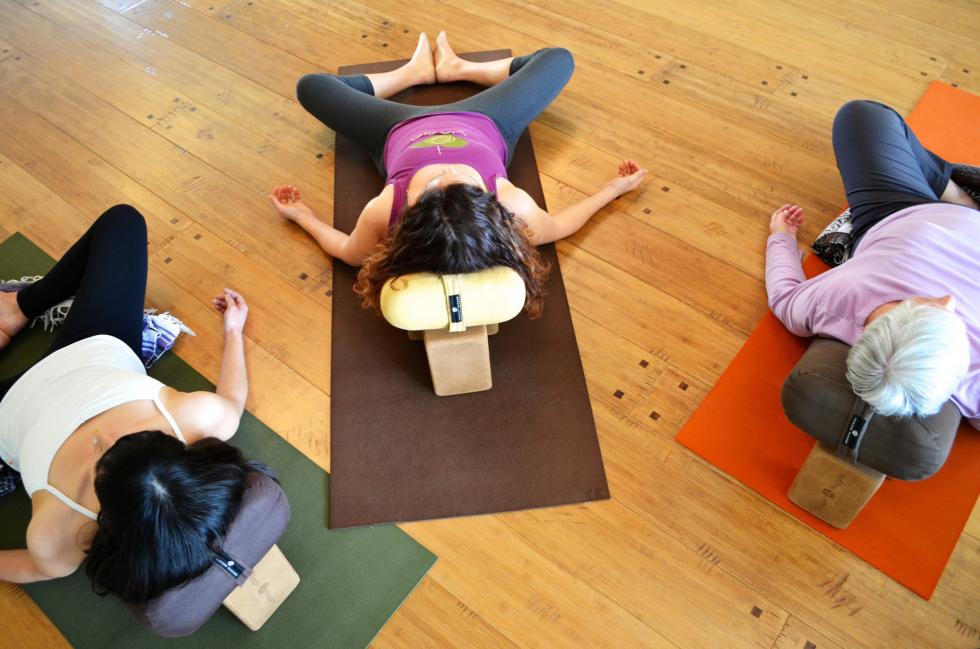When it comes to mental and physical well-being, the rules seem simple: Those who drink plenty of water, get enough sleep, eat healthy foods, exercise regularly and engage in joyous activities will be rewarded with decreased likelihood of falling ill, improved mental focus and better overall health.
The list of benefits goes on, yet many Americans find themselves unable to find balance. A 2015 study by the American Psychological Association indicates that 82 percent of Americans report their stress levels either stayed the same or got worse from the year before. The majority of respondents note that money and work are a “very or somewhat significant source of stress.” To manage stress, people often turn to watching television or surfing the web.
Dr. Clifford Saron, a neuroscientist at the UC Davis Center for Mind and Brain, spends much of his time studying how the brain reacts to certain activities, such as mindfulness and meditation. Science is limited in its ability to empirically prove the positive effects of stress management or wellness-related activities, he says. However, he finds the mindless activities in which Americans tend to engage problematic.
Saron became interested in the intricacies of mindfulness as a child and has been researching the effects of mindfulness and meditation on the human brain for 13 years. When it comes to life’s stressors, he often urges people to pay attention — to thoughts, actions and breath — take note of the results and then repeat what works. “We become experts at exactly what we repetitively do,” he says. “Change is not simple and it requires a certain kind of conscious of intentionality to put a space between the impulse to act and the choice to take the action that is going to give rise to a better consequence down the road.”
Saron’s advice makes sense at a basic level: Take the time to do things that are good for you and you will likely feel better in life and perform better on the job. And adding mindfulness techniques or restful activities to daily life doesn’t need to be daunting.
Active Focus
Many local practitioners of yoga, meditation and other restful activities hope to dispel the myth that only certain people are capable of participating. Don’t believe the stereotypical scene of someone sitting cross-legged in an empty room at the top of a mountain, says Sacramento-based Meditation Coach Nick Anicich. “You hear about these really deep spiritual meditations and those are great, those happen, but oftentimes you’re just sorting things out,” he says. “You never have to meditate for a half an hour. It could just be three minutes where all you’re doing is focusing in on your breathing.”
Practicing yoga can promote wellness. (Photo courtesy of Meredith
Carty/It’s All Yoga)

Additionally, Michelle Marlahan, of midtown Sacramento’s It’s All Yoga speaks to the benefits of approaching yoga as a complete practice — one that brings in the elements of healthy movement, breath, mindfulness and meditation. The studio teaches a range of classes, “A more active physical practice is important for everything from spine health to correcting ergonomic issues. Restorative yoga, which is all about finding a neutral, comfortable position with props and lots of cushion and then resting there for a nervous system restorative experience, is the most quiet, restful class offered,” she says.
Marlahan also notes that the mind-body connection isn’t about getting it perfect every time. “It’s just noticing how it is, letting yourself feel the feeling in your body and being aware,” she says. “If we can just find time to slow down, the irony is that we’re more productive, we’re more efficient and we’re more creative. Yoga is a really powerful practice to really support the well-being of the entire person.”
Wellness at Work
Some companies in the Sacramento region have made employee wellness a priority for years. VSP Global, headquartered in Rancho Cordova, is one of those companies. Chief Human Resources Officer at VSP Global Kristi Cappelletti-Matthews says the company’s wellness program launched in 2003 with offerings like free health assessments and a goal-based fitness program. Since then, VSP has added an onsite fitness center with affordable classes (including yoga) and healthy food options at onsite cafes.
“We’ve had great success with our wellness program,” Cappelletti-Matthews says. “Last year alone, close to 2,000 employees — nearly 40 percent of our staff — and their dependents were engaged with the program. For us, it’s simple: We prioritize the health and wellness of our employees because it’s the right thing to do.”
If healthy employees are good for the bottom line, VSP likely reaps the reward of the wellness program. When it comes to work, Saron also notes that while time to pursue one’s wellness is important, time for leaning in and getting the job done is just as critical. He has studied people who have attended lengthy silent meditation retreats and points out that achieving heightened states of mindfulness or self-awareness through rest doesn’t always mean a person can seamlessly apply those lessons to everyday life. “Rest is a really wonderful basket to put your eggs in,” he says. “The near enemy of rest, however, is knowing that you’ve still got to solve the problem. There’s no escape from your own capacity.”




Comments
Wellness at work.